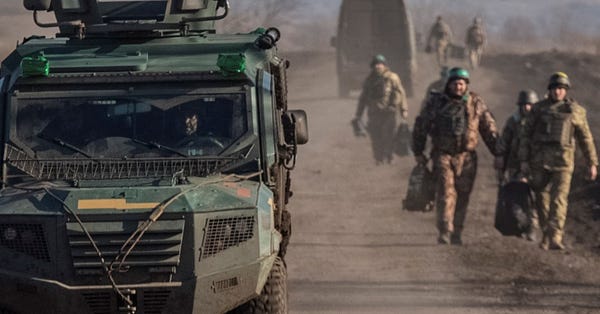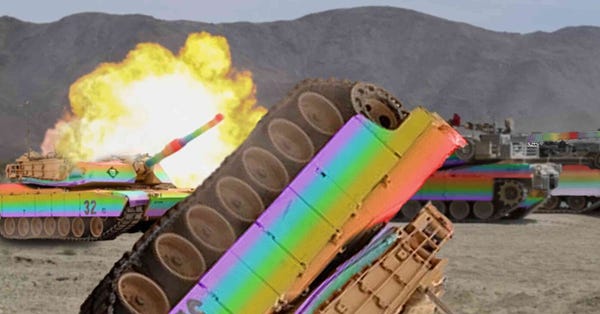In the previous post, What's Behind The Talk Of Negotiations? we devoted a fair amount of space to the new study that was published by the Rand Corporation. The study focused on a cost/benefit analysis for America in a protracted war with Russia. Naturally, in accordance with Western conventions, the issue wasn’t framed that way. It was framed as helping Ukraine resist “unprovoked” aggression from Russia—as if there was no pre-history to this war, as if NATO had not been actively promoting economic and political warfare against Russia with Ukraine as a proxy, and as if NATO had not been preparing for the very real possibility of a Russian military response to all this. In fact, it appears likely that an eventual Russian military response was exactly what NATO desired, in order to provide a pretext for a massive sanctions/military conflict that would destroy the Russian Federation as it currently exists.
The Rand study, probably for political reasons, sought to maintain that fiction of a succesfull US policy


while at the same time addressing the reality that the US war on Russia has failed in a major way, not only locally but globally in political, economic, and military dimensions. The US proxy army in Ukraine has largely been destroyed—the current hubbub about scraping together tanks and other armored vehicles, and possibly planes, is about prolonging the conflict. Rand is not able, for political reasons, to state that conclusion in all its bald reality—it avoids talk of the rise of alternatives to King Dollar in international trade, it avoids discussing the structural damage to US military preparedness generally, and the revelation of the inadequacy of the US military capabilities for a modern conventional war, the damage to US relations with its dependent European states. But that is the background to the study, and a reader is able to see allusions to these issues by reading between the lines a bit.
Rand undoubtedly wanted to avoid being tagged as defeatist, but in view of the clearly visible results of this disastrous policy the Rand study argues strongly that a continuation of the war is heavily weighted against US interests. For political reasons—not least having to do with European politics—certain fictions had to be maintained. The hard reality, however, is as Rand concludes: the costs to the US of continuing this war against Russia decisively outweight any benefits. The US needs to be looking for a negotiated settlement to—or climbdown from—this war.
That conclusion was the focus of the previous post. However, I want to point today to another political aspect to the Rand study or, perhaps, the political context in which the Rand study was published. This is an aspect or possibility that we have raised at various times in the past and which others commentators have also discussed. That possibility has to do with internal disputes within the US Deep State between the Neocon war party and a “negotiations party” centered in the military.
Victoria Nuland, arch Neocon, presented the unapologetic pro-war view in a briefing to the Senate. Nuland did not hide the fact that the US war is as much against Germany as it is against Russia, a fact that the German public is only slowly coming to understand:

Alexander Mercouris, for example, presented the position of the “negotiations party” quite baldly yesterday evening, stating that the uniformed military—and much of the military intelligence establishment—is fully aware of the defeat of Ukraine.
This morning at MoA this division within the Deep State is presented, in the overall context of a discussion of the details within the Rand study. Those details are for our purposes pointless, as they largely constitute a way of softening the impact of the realities that the US is now facing. However, here is what Moon says about the internal divisions within the Deep State:
Moon places the most recent study in overall context by referencing a previous well known 2018 Rand study that formulated what became US policy against Russia, which has run into a brick wall in Ukraine. The idea of that policy was to use Ukraine as a proxy to “extend” Russia, to bring Russia to its knees by focusing on supposed Russian vulnerabilities. Notably—and Moon discusses this—the study, while touting the possibility of harming Russia through sanctions targeting Russia’s energy sector, the study also recognized that an actual war was a high risk venture with low probablity of producing real benefits for the US:
Taking more of Ukraine might only increase the burden [for Russia], albeit at the expense of the Ukrainian people. However, such a move might also come at a significant cost to Ukraine and to U.S. prestige and credibility. This could produce disproportionately large Ukrainian casualties, territorial losses, and refugee flows. It might even lead Ukraine into a disadvantageous peace.
Instead of heeding these warnings …
The Trump and Biden administrations both implemented the measures that seemed to have high benefits as well as high risks.
The results are as we see them today, and they bear out the Rand study’s warnings. The larger question is whether the entire concept of “extending Russia” was a foolish venture to begin with, whether or not it resulted in the war we now have.
Be that as it may, here’s my main point, and I quote the beginning and end of the MoA article. Taken as a whole these excerpts point to a real and fundamental policy disagreement within the Zhou regime, one with important ramifications for America’s future:
RAND Corp is a government and industry financed large research institute. Founded shortly after the end of the second world war it mostly works for the Pentagon by developing policies and strategies.
…
The U.S., says RAND, can take measures that make a quick end of the war possible. It can press Ukraine to start negotiations and to accept a bad outcome by threatening to stop financing the war. It can encourage Russia to enter into negotiations by offering substantial sanctions relief.
At this point, as we’ve seen, Russia has little incentive to accept “sanctions relief” at the cost of entering into negotiations—which would include a ceasefire of some sort. The US has structured this entire conflict so that it is now very much in Russia’s favor to continue the war militarily. That leaves pressing Ukraine to capitulate as an option. The problem for the US is that, as Putin made very clear before the war actually began, Russia is seeking a comprehensive restructuring of its relations with the US led West, including NATO pullback. Russia is geopolitically ascendant in multiple areas at this point, and its benefit is to press home this advantage while the US finds itself backed into a corner of the Neocons’ construction.
Start working on this now, says Rand.
Here’s the key part, based on the relationship between Rand and the Pentagon:
It is likely not by chance that the previous call for an immediate start of negotiations to end the war came from the U.S. Chief of Staff Mark Milley. That he did so publicly was a sign that he had lost the internal White House debate on that issue. He probably asked for the RAND study to bolster his argument.
But the neocons, National Security Advisor Jake Sullivan, State Secretary Anthony Blinken and his deputy Victoria Nuland, who together wage their war against Russia, have Joe Biden's ears and can control the information he gets. Milley and other realist will have a difficult stand.
Steady Russian progress in its campaign will be the best argument for them to win the internal war in Washington DC.
So, here’s my question. Who, within the US power elite, stands to benefit from scandals that could force Zhou from office and could sweep his foreign policy and national security team out with him? If the Pentagon can’t get through to Zhou—surrounded as he is by Neocon minders—would it make sense to begin a campaign of damaging leaks?
Think about what’s going on here.
Two more items.
Scott Ritter discusses the extent of Polish participation in the actual war. He also mentions the participation of other countries, including the US, but since he’s being interviewed by Ania K, who is Polish, he focuses on Poland. I’ve cued the video up:
And finally:





Great summary as ever Mark. You bring together all the best analysts of this appalling situation. In a sane world, the MSM would be doing this kind of digging. The neocons are psychopaths, and like most psychopaths, believe that they are much cleverer and in control than they really are. Your suggestion that Garagegate is a back-alley way to get Biden and the Neocons (sounds like an 80s New Wave group, doesn't it?) out of the way is intriguing and is as good as any other explanation I've heard of so far. It must be galling for Nuland and Co. to realise that their lifelong object of hatred, Russia, is actually being strengthened by their actions and will almost certainly come out on top in Ukraine. These people need to have their hands removed from the levers of power forever - with extreme prejudice - before they do something even crazier.
Hearing Scott Ritter talk about what happens to women and children in the countries the US military intervenes in is heartbreaking.